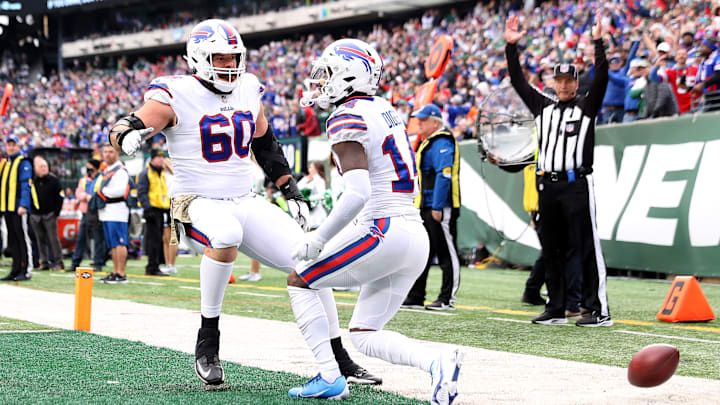The NY Jets' defense was, for all intents and purposes, a trainwreck on Sunday. The Jets were blown out by their division rivals, the Buffalo Bills, by a final score of 45-17 in a game that was never close.
Many were quick to bash the coaching staff for the team's poor defensive performance, not only in this game, but in recent weeks. And one specific decision that came under fire had to do with Bills star wide receiver Stefon Diggs and who the team had covering him.
Or more specifically, who the team didn't have covering him.
Rather than let No. 1 cornerback Bryce Hall shadow him, the Jets opted to allow a host of defenders to cover Diggs to little success. Brandin Echols got his chance, and then when Echols was injured, Javelin Guidry tried his best to no avail.
Diggs finished the game with eight catches for 162 yards and a touchdown en route to his best performance of the season raising questions about why the Jets allowed him to torch their lesser cornerbacks.
Defensive coordinator Jeff Ulbrich attempted to answer those questions when speaking to the media on Thursday.
Ulbrich said they’re not a system that “matches” on first & second down, which is why Diggs was 1-on-1. If the #Jets did that on Sunday, moving a safety over, it opens up middle of field & Buffalo would have just run the ball down their throat.
— Connor Hughes (@Connor_J_Hughes) November 18, 2021
Jeff Ulbrich explained the NY Jets questionable defensive decision making
Ulbrich explained that the Jets don't run a defensive system that matches on first and second down. Essentially, their system doesn't have cornerbacks shadow receivers on early downs.
They line up on their side of the field and defend the player across from them. This is common practice in today's NFL and hardly something isolated to the Jets scheme.
However, teams find ways to get around it, obviously. One such adjustment is to provide additional help over the top so that someone like Echols or Guidry isn't left one-on-one with one of the best wide receivers in football.
Ulbrich attempted to explain why the Jets didn't do that on Sunday, however.
His rationale was that if the Jets were to shade a safety in the direction of the mismatch, it would leave the middle of the defense wide open and susceptible to the run. Essentially, it's a pick-your-poison type of scenario.
That all sounds reasonable in theory, but surely there has to be a middle ground. If there's not, Ulbrich is openly admitting that the Jets' defensive scheme can be easily broken and doesn't really work.
The Jets shouldn't have to force their cornerbacks to match. Especially for a player like Bryce Hall who has little to no experience in a matching system, it doesn't make sense.
But there's no excuse to repeatedly leave players like Echols and Guidry isolated on an island against Stefon Diggs.
You could blame the lack of talent all you want (and such claims are valid), but at the end of the day, the Jets' coaching staff needs to figure out how not to allow 40-plus points a game.
The excuses will only get you so far.
